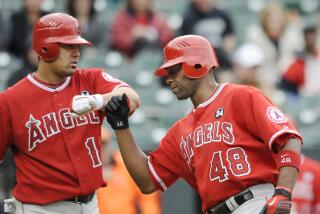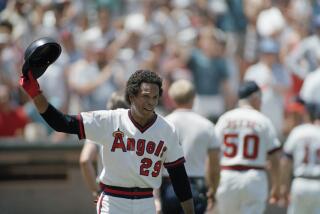The Great Steroids Debate: Witch-hunt or whack-a-mole?
All week long, Mat “Halos Heaven” Gleason and New York Sun baseball writer Tim Marchman are debating steroids in baseball. Monday’s installment probed the possibilities and duties of Angels owner Arte Moreno in disciplining suspected Human Growth Hormone orderer Gary Matthews, Jr; Tuesday chewed on how steroids have changed baseball, and yesterday dealt both with Matthews’ statement of innocence and the ideal punishment for diamond drug-users. Today’s topic: Have players been unfairly maligned in the steroids hysteria, will the anti-doping movement affect non-professional-athlete citizens?
Absence of evidence is not evidence of absence
By Tim Marchman
Mat,
Drug testing programs, by their nature, divide those subject to them into the innocent and the guilty. When baseball had no meaningful program, it made sense for people to speculate that some, many, most or even virtually all ballplayers were juiced up. With the introduction of a tough testing program in 2005, though, speculation had to be shelved, as the public was for the first time given verifiable facts on drug use in the game. Major league players were divided into two camps: Those who tested positive and could be fairly called drug users, and those who didn’t, and thus could only fairly be called clean.
While the average angry baseball fan doesn’t seem to be aware of this, all of 12 players tested positive in 2005. Last year, the number was ... two.
Are players using undetectable, next-generation drugs? Of course. Do drug tests inherently test the I.Q., rather than the body? Yes. Nonetheless, as every American should have learned by now, proceeding on the theory that absence of evidence is not evidence of absence is a deeply foolish thing to do. If ballplayers don’t fail drug tests in their dozens and hundreds, isn’t it just possible that they aren’t quite as hooked on drugs as everyone seems to think they are?
The case of Gary Matthews, Jr. shows how a player can have his reputation ruined just by being linked to drug use even when he hasn’t even been accused of doing anything illegal under either criminal law or baseball’s drug policy. He’s hardly alone, though -- every player’s reputation is harmed when we assume, with little evidence, that baseball has a really substantive drug problem at all. Earlier in our debate you referred to steroids as “the dog that didn’t bark.” Maybe that’s because there’s no dog at all!
This goes to a larger problem that’s probably beyond the scope of our debate, but for which the story of baseball’s drugs problem can serve as a useful allegory: Our willingness, in an age of information saturation, to just assume things that everybody know are true despite the absence of any evidence. Everybody knows, for instance, that Iran is busily working on a threatening and advanced military nuclear program, despite there being literally no publicly available evidence that this is so, and plenty of evidence that even assuming evil intentions, their technical capabilities are a decade or more from allowing them to do anything about them. Similarly, everybody knows that we need hundreds of military bases in far-flung countries all around the world, that income inequality is a major economic (as opposed to moral) problem, that the Internet is going to destroy the newspaper, and that Wilco is worth listening to, despite there being a fair amount of reason to think none of this is true.
I’m not ready to make the argument that we should be concerned about the way steroid hysteria has wrongly ruined the reputation of major league ballplayers and subjected them to the threat of arbitrary federal drug testing because it might lead in some linear way to similar programs being enacted against other undesirable people, though it doesn’t seem too far-fetched that federalized drug testing for pro sports could lead to, say, federalized drug testing for SSI or Medicaid recipients, rationalized as “means testing” or some such. This hysteria does, though, shed a lot of light on how easily gulled we are by whatever the tulip craze of the moment is. In this as all cases, let’s look at the verifiable information at hand and draw cool judgments, rather than getting suckered into thinking that things are so just because we know they are.
Tim Marchman writes about baseball for the New York Sun. He is quite sure that tabloids will be blackening people’s hands long after we’ve solved the age-old problem of death by means of nanotechnology.
What about NFL juicers?
By Mat Gleason
Tim,
Citing the declining number of positive steroids tests was going to be part of my argument; thanks for making it. This shows that the stigma of being associated with steroids is a deterrent. Gary Matthews Jr. may have had his reputation put on the sacrificial pyre, but he never mentioned whether he received a shipment of juice in his statement. Again, the public clamor will deter other players from pursuing illegal and unethical performance enhancements.
Your focus on the potential for government-mandated steroid testing, unleashing the feds on the bloodstreams of ordinary citizens, is precisely the opposite direction that I believe we’re headed. The steroid “hysteria” is a prime example of the fed’s inability to do anything well, and so in the absence of ability, policy is aimed at a convenient, high-profile target, and the grandstanding commences until Henry Waxman is satisfied that he has been on television enough this election cycle.
The real victim in this is Commissioners Bud Selig. That the commissioners of the NBA and especially the NFL have skated free of culpability while Major League Baseball has been paraded down the congressional gauntlet is an abomination. That baseball is the easiest sport to measure individual achievement is both a blessing and a curse -- the rich lore of baseball accomplishments are compiled into record books, but are used against the sport as evidence of juicing. That the game is threatened by an uneven playing field has been addressed. Meanwhile other sports, along with the Pre-Emancipation Proclamation NCAA, are still bastions of better mauling through chemistry.
Representatives of another sport should suffer sweating under the glare of C-SPAN lights reflecting off Waxman’s head. Baseball’s PED policies are working; it is to be congratulated and used as a model to level the playing field in other professional sports.
Mat Gleason is the publisher of Coagula Art Journal. As “RevHalofan” he blogs daily about the Angels at Halos Heaven.
More to Read
Go beyond the scoreboard
Get the latest on L.A.'s teams in the daily Sports Report newsletter.
You may occasionally receive promotional content from the Los Angeles Times.






